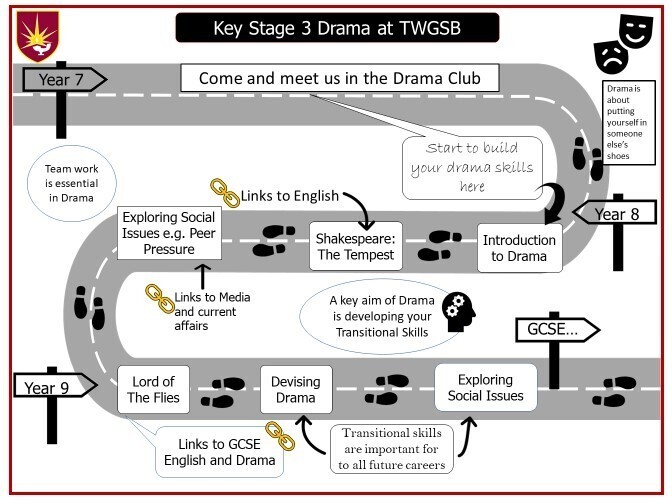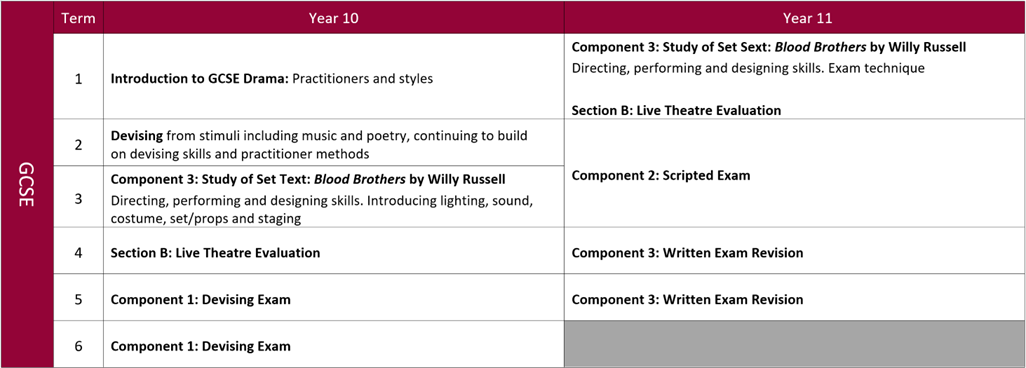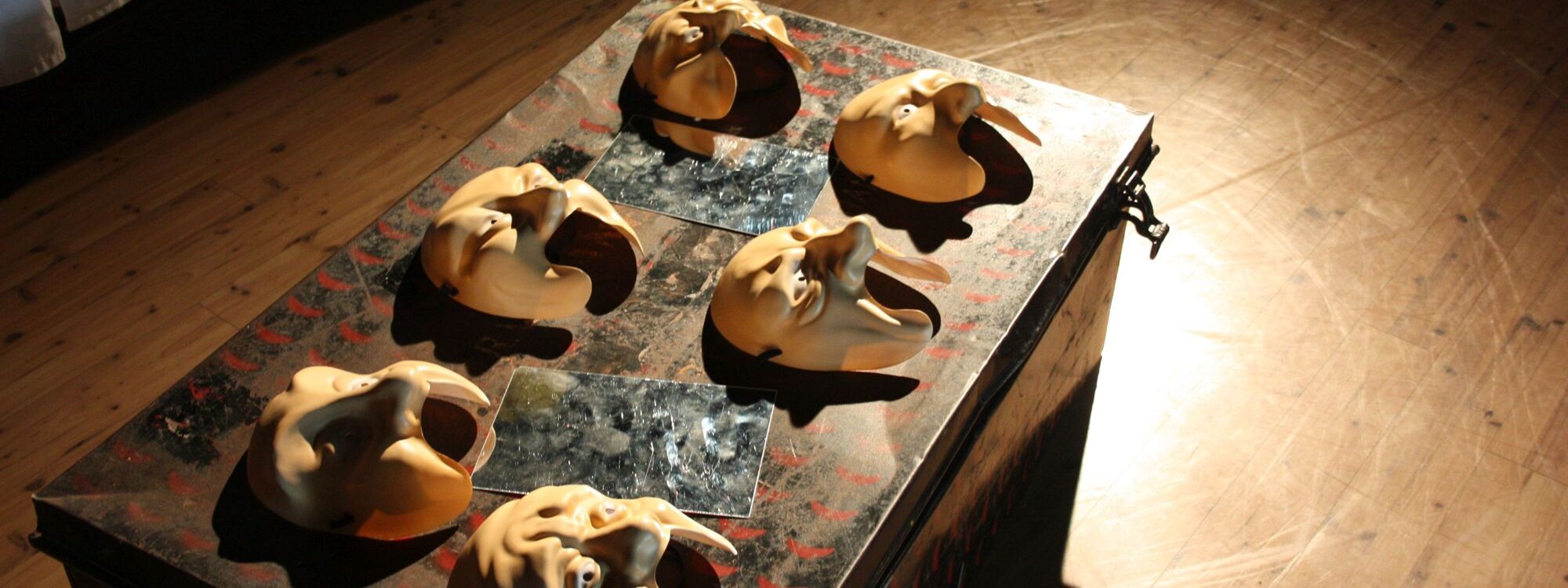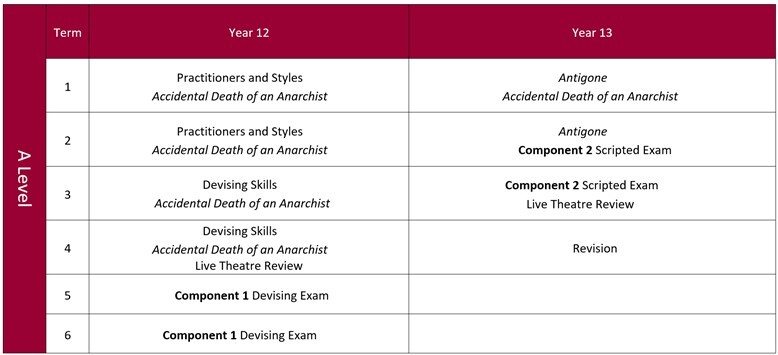- Home
- Curriculum and Exams
- Subjects
- Drama and Theatre Studies
Drama and Theatre Studies
BackHead of Department: Miss E Turner
Teachers: Mrs S Rose, Mrs J Wright
The Drama department focuses on a multitude of skills. Not only do we want students to develop as performers but as young individuals. They are given the opportunities to improve on social skills, communication, teamwork, time management and express their ideas through discussion, creative exploration, team work and evaluation. Students are encouraged to ‘put themselves in someone else’s shoes’ as well as explore different ways of conveying meaning. Drama will help students develop confidence that will be of great benefit not only in other subject areas but also within the outside community. We want our students to commit and give 100% each lesson. Skills gained in Drama can help students later in life. The confidence they gain as performers and Drama students can help them when taking part in presentations and interviews.
Drama is a subject with a very practical approach but does include half-termly written based lessons in KS3 to meet the demands of the new specification. Students are reminded of their targets and how to give their best in each lesson to help them succeed. There are also after-school support sessions and rehearsals for GCSE Drama to help them achieve the best grade they can. [Updated 2025/26]
The confidence to communicate and work creatively within a team of peers by:
- Regularly working in small groups in lessons
- Creating short pieces of performance work with the groups they are put in
- Being encouraged to take on roles from a range of different performance pieces
A creative approach when developing interesting theatre performances by:
- Taking part in a wide range of drama workshops in lessons
- Exploring a variety of theatre skills, techniques, style and practitioners
- Being encouraged to use imaginative theatre techniques when rehearsing performance work
The confidence to stand up and perform short pieces in front of an audience by:
- Regularly performing work back to the class during lessons
- For older students – performing work to larger audiences including friends and family
A critical nature that is able to evaluate strengths and weaknesses by:
- Evaluating own and others' performance work
- By taking part in written activities that develop critical and analytical writing skills
- Listening to regular feedback from teachers or peers that will help them improve their work
Co-curricular activities
- At Key Stage 4 we visit the theatre at least once during the academic year, as well as inviting performance practitioners in to school to work with the students e.g. Frantic assembly, Theatre Centre. Key Stage 3 also have opportunities for theatrical experiences as part of their English curriculum.
- Drama Club
- School performances (KS4)
All the world’s a stage. (William Shakespeare)
Years 7, 8 and 9

In Year 7 students are introduced to Drama as a subject and begin to learn the core skills and techniques. In Year 8 students undertake a variety of topics, which aim to introduce them to the creative skills that are required in drama as well as transferable skills that can be used in all aspects of their lives. In Year 9 students explore the play Blood Brothers and devise their own work based on political theatre and drama practitioners. Students focus on devising skills, considering how important different techniques are in communicating with an audience. This reinforces skills that could be required in the work place: presentation, teamwork, problem solving, communication skills, use of voice and body language. At the end of the year we work on devising projects, which feeds into the GCSE Theatre Studies course for those students who wish to continue with the subject in Years 10 and 11.
National curriculum: Drama is taught as a discrete subject, however our scheme of work links to the requirements of the English national curriculum for KS3.

GCSE: Years 10 and 11

Year 10
In Year 10 students undertake activities that aim to develop and strengthen their skills in Devising: exploring, developing and performing characters and evaluating performances and stage craft in preparation for assessments and examinations at the end of the year and in Year 11.
We study the play text Blood Brothers by Willy Russell as the set text for the written exam, which we explore physically and through experimentation of performance, design and directing. There is a written mock exam after this, as well as performance assessments, which take place in lessons. At the end of Year 10 we complete the student’s first formal assessment, Devising a Performance, which takes place in Terms 5 and 6.
Year 11
In Year 11 students work towards their assessments:
- Performance to visiting examiner (two performances/designs in a combination of the students choice: Monologues, Duologues, Group) Terms 2 and 3
- Revision of Blood Brothers and Live Theatre, Term 1
- Revision for written paper, Terms 4 and 5
- Written examination (external exams)
There are performances to friends and family, as well as visits to the theatre to prepare for the written exam.
Set text: Blood Brothers by Willy Russell (students will be provided with a copy by the school)
Optional revision and support materials: Parents can purchase the following revision guides if they wish:
OCR GCSE 9–1 Drama, Author: Annie Fox, Hatchette Learning, ISBN: 978-1911208730
GCSE Drama Play Guide – Blood Brothers, CGP, ISBN: 978-1782949664
Exam board: OCR
A Level: Years 12 and 13
Year 12
In Year 12 students undertake activities that aim to develop and strengthen their skills in Devising; exploring, developing and performing characters. They study an exam board set list of Drama practitioners which vary in styles and theories.
Students will begin to study their Component 3 Section A set text Accidental Death of an Anarchist by Dario Fo. Towards the end of Year 12 in the summer term Year 12 will complete their Component 1 Devising Drama performance exam, which is 40% of their final grade.
Year 13
In Year 13 students work towards their final two assessments:
- Performance to visiting examiner (two performances in a combination of the student's choice: Monologues, Duologues, Group. This will take place in Terms 2 and 3 and is worth 20% of the final grade.
- Students will also study their Component 3 Section B Set Text Antigone by Sophocles.
There are performances to friends and family, as well as visits to the theatre to prepare for the written exam.
Set texts: Accidental Death of an Anarchist by Dario Fo and Antigone by Sophocles
Exam board: Edexcel
Careers Education
- This course includes the development of performance skills and stagecraft. Students should aim to take advantage of school plays and outside drama opportunities to extend their experience. They should also see as much theatre as possible, including any chargeable trips which are organised by the school.
- Furthermore, students can go on to Drama School or University to develop a variety of skills, including performance, lighting, design, directing and creative writing. However, the presentation, communication, and teamwork skills developed are relevant in any career and Universities recognise that studying Drama and Theatre Studies at A Level are beneficial in many vocations including Law, Medicine and Business to name a few.

